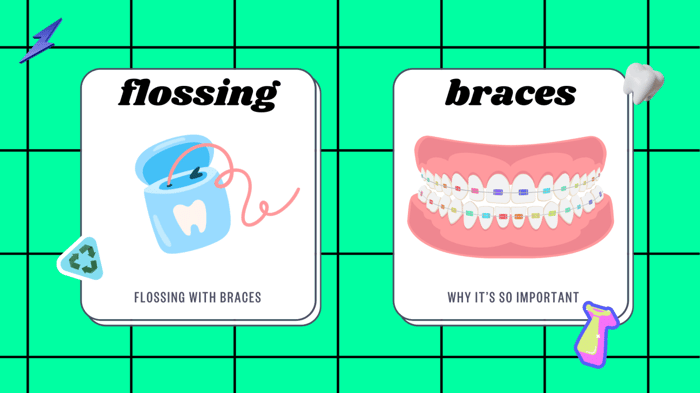Flossing, a simple daily task, can potentially sway the odds in your favor against Alzheimer's disease. Recent studies have found a connection between poor oral health practices, like skipping out on flossing, and heightened risks for this cognitive condition. Surprisingly, your oral hygiene might be a silent player in the functioning of your brain. Let's dive further into the scientific findings regarding the link between flossing and Alzheimer's.
Studies have shown a correlation between gum disease, which can be warded off by regular flossing, and an increased risk of developing Alzheimer's disease. Maintaining good oral hygiene through practices such as regular flossing is crucial for overall health and well-being.
The Link Between Flossing and Alzheimer's Disease
We know - we use to think flossing only had to do with our teeth and gums too! But, it turns out that flossing helps support our entire overall health! Our body's health is often interconnected in ways we might not realize at first glance. Research has started to uncover some intriguing connections between oral health and cognitive function, leading to the belief that maintaining good oral hygiene could play a role in reducing the risk of developing Alzheimer's disease.
Although scientists are still working to reveal the full correlation between the two, one theory is that the same bacteria associated with gum disease (the gross stuff that you floss out from the gum line and in between your teeth) could find its way into the brain through nerve channels in the head or through the bloodstream. Once these harmful bacteria reach the brain, they could trigger an immune system response that leads to inflammation and eventually contributes to the development of Alzheimer's disease.
A study published in the "Journal of Alzheimer's Disease" found that people with gum disease for 10 years had a twofold increase in the rate of cognitive decline compared with those without gum disease. This suggests a potential correlation between gum disease and cognitive function.
Another potential connection is related to chronic inflammation. Gum disease can cause chronic inflammation in the body, and research has shown that chronic inflammation might play a role in the development of Alzheimer's disease.
These findings are still being researched and aren't conclusive yet. Nevertheless, they raise important questions about how our oral health might impact our overall health—especially when it comes to complex conditions like Alzheimer's.
With these suggestive connections being explored, there is growing interest in understanding how our oral health habits might influence our risk of developing such serious conditions. The research might not be complete yet, but it certainly points to the need for further investigation into the relationship between flossing and Alzheimer's disease.x`
Scientific Evidence for the Connection
While it may sound surprising that flossing and oral health could be linked to brain health, a growing body of scientific research has suggested an association. Let's take a deeper look at some key studies and findings that have shed light on this correlation.
The Role of Oral Bacteria
Studies have revealed that the bacteria that contributes to gum disease can enter the bloodstream, triggering an inflammatory response throughout the body, including the brain. This chronic inflammation has been implicated in various neurological conditions, including Alzheimer's disease. Furthermore, a study published in the journal Science Advances found that the bacteria associated with poor oral health were discovered in the brains of individuals who had Alzheimer's. This suggests a potential pathway through which oral bacteria could contribute to neurodegenerative processes.
A notable longitudinal study conducted by the University of Louisville School of Dentistry found that individuals who did not floss or brush their teeth regularly exhibited a significantly higher incidence of dementia later in life compared to those who practiced good oral hygiene routines. These results provide compelling evidence for the significance of oral care in preserving cognitive function.
Furthermore, the same study observed a substantial reduction in cognitive decline among participants who practiced diligent oral hygiene. This implies that maintaining good dental habits, including proper flossing techniques, could potentially offer protective benefits against Alzheimer's and other forms of dementia.
With mounting evidence pointing towards the intricate relationship between oral care and cognitive health, it becomes increasingly crucial to integrate robust dental hygiene practices into our daily routines to safeguard not only our teeth but also our brain health.
Preventive Power of Flossing

Flossing isn't just about removing bits of food from between your teeth. It's a small habit that yields significant long-term benefits. While brushing our teeth is important, it only cleans 60% of the tooths surface. Only flossing can reach the remaining places in our mouth - and bacteria love to hide in those hidden spots. The plaque buildup caused by these bacteria not only leads to gum disease but also contributes to various other health issues, including Alzheimer's.
When we make flossing a regular part of our dental routine, it plays an essential role in preventing the buildup of plaque, which contributes to better oral health. This means healthier gums and teeth, forming the foundation for overall well-being.
By delving deeper into maintaining oral health through flossing, we begin to unravel the intricate connection between the health of our mouth and the health of our brain. Research has shown that gum disease (which is preventable with good oral hygiene practices like flossing) increases inflammation throughout the body, and this inflammation may play a role in diseases like Alzheimer's.
Think of it as a roadblock—without proper oral care, plaque buildup can lead to gum disease, eventually opening up potential pathways for harmful bacteria and toxins to travel throughout your body. By embracing regular flossing habits, we're implementing a frontline defense against these risks.
Imagine plaque as an unwanted guest that overstays its welcome. The longer it sticks around, the more damage it can cause. Regular flossing not only evicts this unwelcome visitor but also prevents any backup guests from setting up camp in your mouth.
In essence, with every stroke of floss through our teeth, we are engaging in an act of prevention—a small but powerful step toward overall health and well-being.
Need Help Making Flossing Part of Your Routine? Try an Electric Flosser!
By now, we understand how important flossing is for our overall body and wellness. And yet, it can be a difficult task for some to fit into their routines. If you're someone who struggles with incorporating traditional flossing into your daily routine, perhaps an electric flosser might help! Electric flossers, like Flaus, make flossing as quick, comfortable and easy as brushing your teeth. Flaus has 18,000 sonic vibrations per minute that help stimulate your gums. It's ergonomic design makes flossing less gross (no more hands in your mouth) and allows you to floss up to five times faster! It has been reported that 8/10 customers floss more after purchasing Flaus than they did before, which means if you're looking to build a habit, Flaus might be a great tool for you as well.
Now that we've explored how flossing contributes to a healthy mouth and its connection to broader health concerns such as Alzheimer's, let's delve into the influence of oral bacteria on mental health.
The Role of Oral Bacteria in Mental Health
The mouth is home to a bustling community of bacteria, some helpful and others... not so kind. One of those 'not so kind' bacteria groups has been implicated in influencing more than just dental well-being. Recent studies have suggested that certain strains of oral bacteria may find their way into the bloodstream through inflamed gums and from there, travel to the brain. It’s a concerning thought – bacteria from our mouths potentially winding up in our brains.
These traveling bacteria aren't just on a sight seeing trip though - they may actually have an effect on our mental health, contributing to conditions like Alzheimer's disease, a neurodegenerative disorder. It's still an area under investigation, but the idea behind it is pretty straightforward: if these bacteria manage to reach the brain, they could potentially contribute to the development or progression of conditions like Alzheimer's.
In a way, it’s like dealing with unwelcome houseguests who refuse to leave and have unsettling implications for your home's well-being.
Think of it like this: when you let strangers into your home and don’t supervise them closely enough, they can cause problems without you realizing it until it's too late.
This same principle applies to your body: negligent dental care might allow harmful bacteria to run rampant, increasing the risk of issues far more serious than a toothache. The consequences could reach all the way up to your brain.
It's akin to securing the gate of a castle - only the good guys get in and out while keeping an eye on anyone suspicious.
By virtue of establishing a direct connection between oral bacteria and brain health issues such as Alzheimer's disease, it becomes clear that maintaining good dental hygiene practices may be crucial in promoting overall well-being.
Impact of Plaque and Tartar on Brain Health
Plaque and tartar can be pesky enemies to your smile, but they might also pose a surprising threat to your brain health. When not dealt with, these buildup substances can lead to gum disease and inflammation, which have been linked to cognitive decline and potential long-term damage to brain function. Here's how it all unravels:
Plaque is the soft, sticky film that builds up on your teeth over time from leftover food particles mixed with saliva. If not removed through proper brushing and flossing, it hardens into tartar (also known as calculus), a stubborn substance that can only be removed by a professional dental cleaning. This is where things can take a turn for the worse.
Tartar buildup around the gumline can lead to gingivitis, an early stage of gum disease characterized by redness, swelling, and sometimes even bleeding of the gums. And if left untreated, this can progress to periodontitis, a more serious form of gum disease that leads to bone loss around the teeth.
But what does this all have to do with your brain, you might ask? Well, research has shown that chronic periodontitis is associated with an increased risk of developing cognitive issues later in life. In fact, the inflammation caused by gum disease might actually trigger an inflammatory response in the brain, which has been linked to cognitive impairments such as Alzheimer's disease.
Imagine it like this: Just as a city's infrastructure can start crumbling if its foundations weaken, so too can our cognitive function as gum disease causes inflammation in our bodies that may eventually extend to our brains. It would be quite troublesome if an overlooked build-up in something as small as your mouth could lead to such significant consequences for your entire body.
This is why taking care of plaque and tartar build-up through regular flossing and dental check-ups is not just about maintaining a dazzling smile; it's about preserving your brain health as well.
Gingivitis as a Risk Factor
Gingivitis is like a little warning sign from your body. When you see red or swollen gums, it's telling you something might be wrong with how you've been taking care of it. It's your mouth's way of saying, "Hey, I need some extra care!" Poor oral hygiene can quickly lead to gingivitis. This common gum disease causes inflammation in your gums, and if left unchecked, it can spread inside your body. Chronic inflammation from gingivitis doesn't just stop at your mouth; it can lead to systemic inflammation throughout your body.
Systemic inflammation is like a storm brewing inside your body. It isn't just about gums swelling—it can mean trouble for other parts of your body too. As this inflammation spreads, it may affect different systems in the body, and research indicates a link between chronic inflammation and several health conditions, including heart disease, diabetes, and even Alzheimer's disease.
Think of your body as a team of builders working on a skyscraper—the slightest problem with one worker can lead to bigger issues. Inflammation from an unhealthy mouth doesn't just stay there; it travels through the bloodstream to other parts of the body, potentially causing widespread damage over time.
So how does flossing fit into all of this? Well, flossing helps remove the plaque and bacteria that cause gum disease. It's like giving those pesky particles an eviction notice before they have a chance to turn your gums into their new home. By keeping your gums healthy and free from plaque buildup, flossing directly fights off the potential for gingivitis and subsequent inflammation.
In essence, flossing acts as a shield against both gingivitis and its harmful side-effects on the rest of your body. By reducing the levels of harmful bacteria in between teeth and along the gum line, you're not only benefiting your oral health but also potentially lowering the risk of chronic inflammation cascading throughout your body.
As we explore strategies for implementing oral hygiene practices tailored to Alzheimer's prevention, it becomes apparent that small daily habits can make a significant impact on long-term health outcomes.
Implementing Oral Hygiene for Alzheimer's Prevention
Good oral hygiene not only keeps our teeth and gums healthy but can also play a role in maintaining our overall well-being. As we continue to explore the connection between oral health and Alzheimer's, it is believed that regular flossing may contribute to reducing the risk of cognitive decline. Taking measures to create a healthy mouth environment can be a proactive and inexpensive step towards preventing not just gum disease, but potentially conditions like Alzheimer's.
Let's break down why this might be the case. Bacteria from gum disease can enter the bloodstream and travel to other parts of the body, including the brain. This can cause an inflammatory response, which some researchers believe may contribute to the development or progression of Alzheimer's disease. By practicing good oral hygiene and flossing regularly, there is a potential to reduce harmful bacteria in your mouth that could otherwise spread to other areas of your body.
For instance, think of flossing as clearing out a clogged drain in your sink. By removing food particles and bacteria from between your teeth, you’re helping to ensure that your body isn’t sending out signals for an immune response against harmful invaders. While it’s not a guaranteed way to prevent Alzheimer’s, evidence suggests that it’s one step among many that can help promote overall health including brain health.
So simply put, keeping up with good oral hygiene practices is an important part of taking care of ourselves as we age. Moreover, as we consider dental care techniques such as flossing, embracing modern advancements like electric flossers offers an effective and convenient way to maintain oral health. If you're looking for more information on effective flossing techniques electric flosser options, we suggest looking at Flaus, as it will provide a quick, comfortable and easy approach to flossing.
Maintaining good oral hygiene doesn't just contribute to healthy teeth; it may also play a valuable role in promoting overall well-being, especially when it comes to brain health. Remember, small steps like regular flossing can go a long way in preventing potential health complications associated with poor oral hygiene.
Is there any scientific evidence to support the claim that flossing can reduce the risk of Alzheimer's disease?
Studies have shown a potential association between gum disease and cognitive decline, further research is needed to establish a causal relationship. It is important to note that maintaining good oral hygiene, including flossing, has broader benefits for overall health and can contribute to reducing the risk of various diseases.
How does oral health, including flossing, contribute to overall brain health and potentially prevent Alzheimer's?
Maintaining good oral health, including regular flossing, plays a crucial role in promoting brain health and potentially preventing Alzheimer's. Research suggests that the bacteria responsible for gum disease can reach the brain through nerve channels or by entering the bloodstream, triggering inflammation and increasing the risk of cognitive decline. Additionally, studies have found a correlation between poor oral hygiene and an increased risk of Alzheimer's disease. Therefore, taking care of our teeth and gums through practices like flossing may reduce inflammation, limit bacterial exposure to the brain, and contribute to overall brain health.
Are there specific types of floss or flossing techniques that are more effective in preventing Alzheimer's?
While there is no specific type of floss or flossing technique proven to be more effective in preventing Alzheimer's, maintaining good oral hygiene overall plays a crucial role in promoting brain health. Regular flossing helps prevent gum diseases like periodontitis, which has been linked to an increased risk of cognitive decline and Alzheimer's. A study published in the Journal of Alzheimer's Disease found that poor dental hygiene may increase the risk of developing Alzheimer's by up to 70%. Therefore, it is essential to prioritize consistent flossing as part of a comprehensive oral care routine for optimal brain health.
What other lifestyle factors, apart from flossing, are associated with a reduced risk of Alzheimer's disease?
Regular exercise, a healthy diet rich in fruits and vegetables, maintaining a socially active lifestyle, getting enough sleep, and engaging in cognitive activities are all associated with a reduced risk of Alzheimer's disease. Studies have shown that physical activity can decrease the risk of Alzheimer's by up to 50%, while a Mediterranean-style diet has been linked to a 35-40% lower risk. Social engagement and challenging cognitive activities also contribute to brain health and reduce the risk of cognitive decline. However, it's important to note that these factors cannot guarantee prevention but may help promote brain health.



















